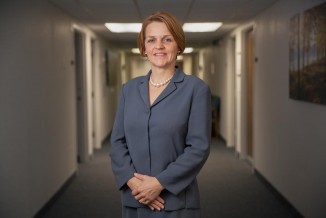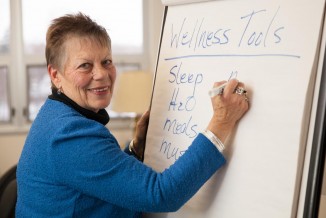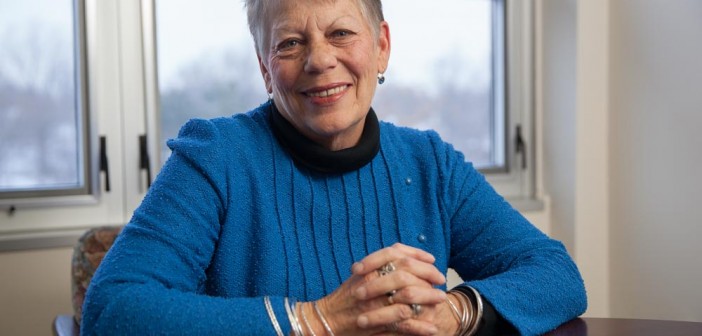 No one wants to experience depression or suicidal thoughts during the holidays, yet for many people who have a mental illness, these feelings are a tragic reality. Fortunately, help during this and other times of the year is only a phone call away…
No one wants to experience depression or suicidal thoughts during the holidays, yet for many people who have a mental illness, these feelings are a tragic reality. Fortunately, help during this and other times of the year is only a phone call away…
Based on past experience, everyone at Genesee Health System (GHS) is gearing up for what will be a busy January. While the rest of the community will be basking in the afterglow of the holidays, the GHS team knows that the first month of the year is difficult for their clients. This is proven by the volume of calls handled by the facility’s Crisis Hotline: January averages 500 calls, says Katie Baxter, GHS Access Manager, while every other month typically tops off at 300.
“Some people experience a crushing letdown when the holidays don’t live up to what they had hoped,” said Katie Baxter, GHS Access Manager. “In many situations, our clients reunite with their families over the holidays only to be cast out again after arguments or fights. This usually puts them back on the streets feeling lonely and alienated.”
Perhaps the saddest thing about people contemplating suicide is that they tend to see it as their only option. In truth, a person has many other options, which is why anyone struggling with these feelings should call the GHS Crisis Hotline. “When someone calls the Hotline,” Baxter said, “our team of crisis intervention therapists assesses how the caller is feeling and why, then recommends a specific course of action.” A therapist’s response ranges from suggesting a variety of local community services to having the caller taken to an area hospital for evaluation. “It all depends on the severity of the individual’s situation and current state of mind,” she added. “One thing is for certain: the earlier they call, the sooner they can be on the road to recovery.”
 A Crisis Hotline operator herself, Baxter says the emotional toll these desperate cries for help take on GHS counselors is very real. She’s proud to say that her team never gets discouraged though, even after handling a high volume of calls from people in the grips of dark thoughts and emotions. “When it comes to helping people and connecting them with the services they need, the rewards outweigh the negatives,” she explained.
A Crisis Hotline operator herself, Baxter says the emotional toll these desperate cries for help take on GHS counselors is very real. She’s proud to say that her team never gets discouraged though, even after handling a high volume of calls from people in the grips of dark thoughts and emotions. “When it comes to helping people and connecting them with the services they need, the rewards outweigh the negatives,” she explained.
In addition to the Crisis Hotline, GHS offers direct help to those in need at its 420 W. Fifth Avenue facility in Downtown Flint. Typically presented in a group session format, the center’s Wellness Recovery Action Planning Services teaches a variety of strategies designed to help clients learn useful life skills and maintain emotional stability throughout the year. “We empower them to utilize the resources available in the community,” said Gizela Schwartz, GHS Certified Peer Support Specialist and Recovery Coach. “These strategies help them move forward and enjoy a better quality of life.”
“At this time of year,” Schwartz said, “a variety of factors can affect overall health and wellbeing. The decrease in daylight hours alone can have a significant impact upon a person’s energy level and sleeping patterns, which has effects on their mood overall.” When this and other factors combine with the stress people face during the holiday season, Schwartz says the results can be heart-wrenching.
Schwartz knows all too well how the feelings of anxiety and depression can overwhelm people, especially during the holidays. Many years ago, she experienced depression and emotional pain associated with the trauma she sustained during a difficult childhood. This inspired her to seek healing and eventually become a peer-to-peer counselor at Flint’s Southwestern High School. After many years and accomplishments, her journey culminated in January 2009 with her position at GHS.
As the folks at GHS continue to help their clients, Katie Baxter says the community can “help the helpers.” In addition to direct monetary donations and volunteer service, she urges residents to support as many of Genesee County’s charitable organizations as possible. “We direct our clients to the many area food banks and non-profit organizations,” she explained, “so assisting these service providers is a great way to also help our clients.”
Baxter urges people to seek help for any family member who is homeless, struggling with mental illness or is developmentally-disabled. “Talk to them and find out if they have a case manager with GHS,” she said. “If they don’t, bring them to our facility or just give us a call.” She also stresses the importance of compassion. “There is a stigma attached to people who suffer with these conditions,” she said, “and it often leaves them feeling alienated and neglected.”
In addition to helping family members, Baxter reminds everyone to also be mindful of their own emotional well-being. “When dealing with a mentally ill family member,” she said, “it’s best to set limits. If you try to solve all of their problems, it’s easy to become overwhelmed and give up on those who need help the most.” In these situations, she urges concerned family members to contact GHS.
The idea of being alone during the holidays seems like the worst thing in the world. Songs have been written about this topic, all dripping with the faux heartache and bemoaning the loss of their “special someone.” When compared to the very real challenges faced by the homeless and developmentally disabled, a “blue Christmas” is nothing more than a first-world problem. Those for whom daily life is a constant struggle deserve to experience the magic that this time of year can bring, and we should all be thankful for the work done by the good people at Genesee Health System and all area charity organizations. ♦














